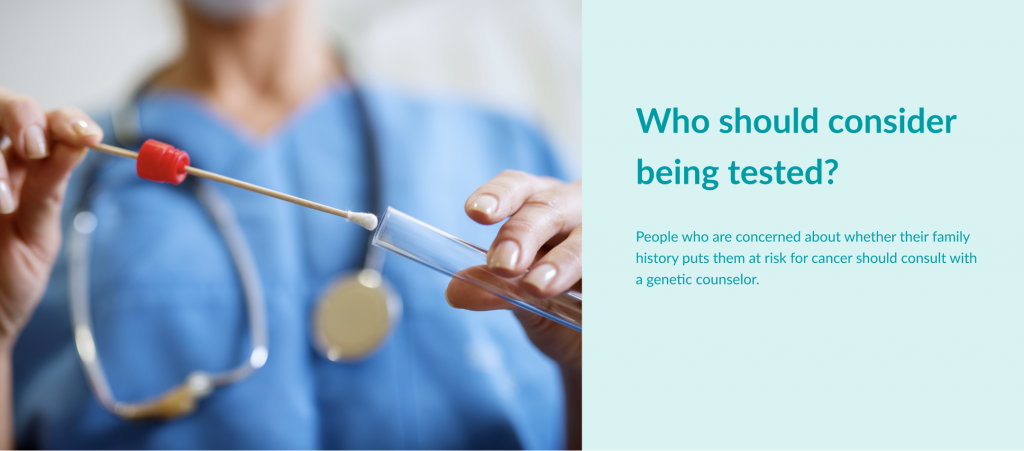
Possible Benefits of Genetic Testing for Breast and Ovarian Cancer Risk
A negative test result:
- If you have been diagnosed with ovarian cancer, it may provide a sense of relief regarding the future risk of other cancers and the possibility that special checkups, tests, or preventive surgeries may not be needed;
- If you haven’t been diagnosed with ovarian cancer, it will tell you that you don’t have a genetic disposition for the genes you tested for;
- May provide a sense of relief that your children are not at risk of inheriting the family’s cancer susceptibility.
A positive test result:
- May help resolve uncertainty regarding future cancer risk;
- Will allow people to make informed decisions about their future health care, including taking steps to reduce their other cancer risks;
- Will allow people to choose to participate in medical research that could, in the long run, help provide better treatment outcomes. For example, “BRCA1/2 pathogenic or likely pathogenic variants qualify for and have been associated with higher rates of response to FDA-approved treatments such as poly (ADP-ribose) polymerase (PARP) inhibitors” (Konstantinopoulos, et al., 2020, p. 1223).
Like many other tests, genetic testing may have some negative impacts on people. The next section outlines some potential harms of genetic testing for patients and family members.
Possible Harms of Genetic Testing for Breast and Ovarian Cancer Risk
The direct medical harms of genetic testing are minimal, but knowledge of test results may have harmful effects on a person’s emotions, social relationships, finances, and medical choices.
People who receive a positive test result may feel anxious, depressed, or angry, particularly immediately after they learn the result. People who learn that they carry a BRCA mutation may have difficulty making choices about whether to have preventive surgery or about which surgery to have.
People who receive a negative test result may experience “survivor guilt,” caused by the knowledge that they likely do not have an increased risk of developing a disease that affects one or more loved ones.
Because genetic testing can reveal information about more than one family member, the emotions caused by test results can create tension within families. Test results can also affect personal life choices, such as decisions about career, marriage, and childbearing.
Violations of privacy and of the confidentiality of genetic test results are additional potential risks. However, the federal Health Insurance Portability and Accountability Act and various state laws protect the privacy of a person’s genetic information. Moreover, the federal Genetic Information Nondiscrimination Act, along with many state laws, prohibits discrimination based on genetic information in relation to health insurance and employment, although it does not cover life insurance, disability insurance, or long-term care insurance.
Finally, there is a small chance that test results may not be accurate, leading people to make medical decisions based on incorrect information. Although it is rare that results are inaccurate, people with these concerns should address them during genetic counseling.
Sources:
1. Courtesy of the Centers of Disease Control and Prevention: https://www.cancer.gov/about-cancer/causes-prevention/genetics/brca-fact-sheet#how-much-does-having-a-brca1-or-brca2-gene-mutation-increase-a-womans-risk-of-breast-and-ovarian-cancer
2. Adapted from National Cancer Institute: BRCA Mutations: Cancer Risk and Genetic Testing,https://www.cancer.gov/about-cancer/causes-prevention/genetics/brca-fact-sheet#how-much-does-having-a-brca1-or-brca2-gene-mutation-increase-a-womans-risk-of-breast-and-ovarian-cancer
Additional Readings:
- National Ovarian Cancer Coalition: Types & Stages of Ovarian Cancer, http://ovarian.org/about-ovarian-cancer/what-is-ovarian-cancer/types-a-stages

